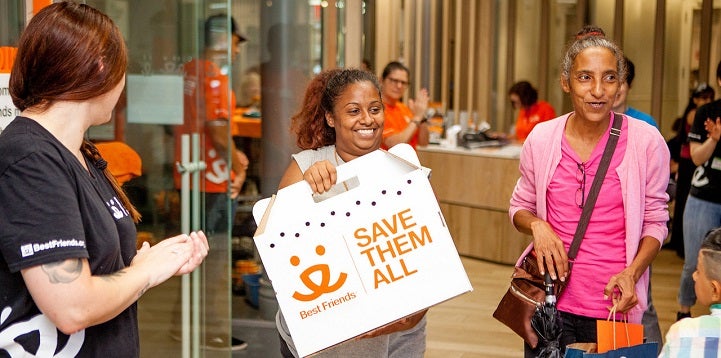
People Experience Council Shares First Steps in DEI Work
Diversity, equity and inclusion (DEI) are foundations of building a strong company culture, one that empowers everyone to do the work and allows us to reach every animal lover—especially those who have historically not been represented in our movement.
We have shared a lot of our work about pursuing DEI with you, including the fact that we’ve added it into Best Friends’ mission and have convened six culture councils comprising staff at all levels. Although the work is just getting started, you must start somewhere if you’re going to build some actionable steps and we think it’s important to share the process with our Network partners. After all, many organizations are turning inwards, and it can only help to see how others are undertaking this journey.
As co-chair of the People Experience Council, I wanted to share where we are so far on writing an organizational statement on DEI and creating an interview guide with a cultural focus for hiring managers. Our charter is focused on attracting and developing more diverse staff and volunteers at all levels as well as building out opportunities for advancement and proactive retention efforts, particularly among front-line staff. These first projects are going to give us concrete tools to achieve those ends.
We’ve spent a lot of time on the official DEI statement, which has to reflect our brand and what Best Friends is all about yet do so using language that speaks to diverse populations. It’s tricky to make sure it has the “Best Friends voice.” Our focus on long-range ideologies may not resonate with people who are more focused on dealing with the day-to-day, so we need to use practical language to reach the broadest scope of people.
When I asked Kira Ikeda, volunteer and VIP experience coordinator, what she felt we should share about the statement, she said, “The heart of our organization is the animals so I'm especially proud of the diversity statement we are working on. That will tie everything together to remind us that we are all unique individuals with different backgrounds and experiences who have a role to play in helping the animals we’re all so passionate about.”
Our other major project right now is the interview guide for hiring managers, whose content ranges from defining what the interview process should look like to providing guidance on reducing your personal bias to detailing what types of questions you should ask. It’s something that our Network partners may be able to use as a guide, but I would stress that every organization has to come up with their own documents.
In particular, the questions being asked in a job interview should be aligned with what your organization wants its culture to be. To get there, you need to do the deep work of analyzing where you are, thinking about where you want to be, and then coming up with a plan to get there. Once you are in tune with who you are as an organization, you can base your questions on that.
For instance, one of Best Friends’ guiding principles centers on transparency, or being open and honest in all our relationships. So, a question we are considering is, “How do you make sure you are the same person no matter who is or isn’t in the room?” Answers to those kinds of questions can identify if someone a cultural fit. This example also ties into treating all people, no matter their ethnicity or social circumstance, equally.
I think one of the big red flags that has driven our lack of DEI is an insistence that animal welfare experience is a must. That keeps us hiring from the same pool of people. Employers should expect to train their people, because asking them to be 100% ready to hit the ground running is a hindrance to many people joining a particular organization.
Such training is also something to incorporate on an ongoing basis, so that there is opportunity for growth but also for growth within a certain position. I have read many exit interviews in my career and one of the main things people say is that, regardless of the department where they came from, they felt there was no opportunity for growth. How better to have people who are already skilled in doing a good job than to bring them in not expecting that at the outset, but providing what they need along the way?
I’ll wrap this up with another bit of feedback from fellow council member Kaitlyn Simmons, manager of grassroots advocacy, who captured how our group feels about the work we are doing:
Time and again in conversations I’ve been a part of in animal welfare in various organizations, I’ve heard that people want to do better but just don’t know how. What excites me about this work is not accepting “we don’t know how” as an answer. Instead, we are looking at other organizations that do this well [such as Companions and Animals for Reform and Equity (CARE)] for inspiration. At the same time, we are looking deep into our organization to figure out how to solve for this.
I love that I get to be a part of creating more holistic, thoughtful policies for our organization—and challenge myself to be a better colleague and human in the process.
Like many of the councils, the People Experience team is working closely with Companions and Animals for Reform and Equity (CARE) to shepherd them carefully through this process. Check out CARE’s blog for some insightful pieces on the DEI experience.
Dawn Binion-Stewart
HR generalist, human resources
Best Friends Animal Society
If you enjoyed this program spotlight, you can find our complete catalog of spotlights here.